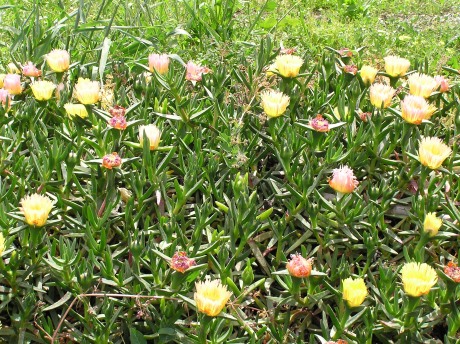zurück Rhodos
Blumen
last
Blumen 14
next

Fettes Grass fette Henne
Fat Hen
(Chenopodium album) is a common name for
a plant in the Chenopodium genus,
often referred to as wild spinach,
goosefoot, or
lamb's quarters. It is an
edible, fast-growing herbaceous plant that belongs to the
Amaranthaceae family and is
found in many parts of the world. Fat hen is considered both a
weed in many agricultural areas
and a wild edible plant that
has been used in traditional cuisines.
Key
Features of Fat Hen:
1.
Appearance:
-
Height: Fat hen can grow between
30 to 150 cm (12 to 59
inches) tall, with a branching,
sprawling habit.
-
Leaves: The plant has pale
green, ovate or
diamond-shaped leaves with
smooth or slightly toothed edges. The leaves are often somewhat mealy or
powdery on the underside.
-
Flowers: Fat hen produces
small, inconspicuous green flowers
in dense clusters, which bloom in summer. These flowers are not particularly
showy but give rise to seeds
that are small and black or brown when mature.
-
Stems: The stems are
typically branched, and
they may appear red-tinged
or green depending on the
environment.
2. Habitat and Distribution:
- Fat hen is a
weedy plant commonly
found in disturbed soils,
such as gardens, fields, roadsides, and urban areas.
- It is native to
Europe, but has spread
widely to North America,
Asia, and other parts of
the world. Fat hen thrives in
temperate climates and is often found in places where the soil has
been disturbed or where there is human activity.
3. Edible Uses:
-
Leaves: The young leaves
of fat hen are edible and often consumed like
spinach. They can be used
in salads, soups, and cooked dishes. The flavor is similar to spinach,
although it may be slightly more earthy or robust.
- It is recommended to
cook the leaves
before consumption, as they may contain small amounts of
oxalates, which can
interfere with calcium absorption or cause digestive discomfort in large
quantities.
-
Seeds: The seeds of fat
hen can be harvested and ground
into a flour similar to
quinoa or
amaranth. The seeds are
highly nutritious and can be used in baking, porridge, or as a grain
alternative.
-
Nutritional Value: Fat
hen is a rich source of vitamins
(particularly vitamin A
and vitamin C),
minerals (like
iron and
magnesium), and
fiber, making it a
nutritious addition to a diet.
4. Medicinal Uses:
- Fat hen has been used in traditional
herbal medicine for various purposes. Some cultures have used it as a
diuretic and
laxative. It has also
been used to treat conditions such as
constipation,
coughs, and
wounds.
- However, fat hen should be consumed in
moderation, as its high levels of oxalates may be harmful if eaten in large
quantities over an extended period.
5. Other Uses:
-
Forage for Livestock: Fat
hen is also used as a forage plant for livestock, as it is high in nutrients
and grows quickly.
-
Soil Health: Being a
hardy and fast-growing plant, fat hen is sometimes utilized in
cover cropping to help
enrich the soil by adding organic matter, especially in areas where soil
fertility has been depleted.
6. Considerations:
-
Toxicity: While fat hen
is generally considered safe to eat, the plant can sometimes be confused
with other members of the
Chenopodium family that may be toxic, such as
Pigweed (Amaranthus
species). It’s important to positively identify the plant before harvesting.
-
Oxalates: As mentioned
earlier, fat hen contains oxalates,
compounds that can bind to minerals like calcium and reduce their
absorption. People with kidney
issues or gout
should be cautious when consuming large amounts of oxalate-containing
plants.
In Conclusion:
Fat hen (Chenopodium album) is a
versatile, nutritious wild plant
that has been used for food and medicinal purposes for centuries. Though it is
commonly considered a weed in agricultural areas, its edible leaves and seeds
offer a valuable source of nutrients. Whether used in salads, soups, or as a
grain substitute, fat hen is a great example of a wild edible plant that can be
utilized sustainably.
 26.07.25 Copyright Dirk
Rauschenbach Koelnerstrasse 293 51702 Bergneustadt
Datenschutzerklaerung 02261 9788972 Mail ccooly(
at) web.de
26.07.25 Copyright Dirk
Rauschenbach Koelnerstrasse 293 51702 Bergneustadt
Datenschutzerklaerung 02261 9788972 Mail ccooly(
at) web.de
 Safaris
Bergsteigen
Wandern
Inselwandern Weltweit
Safaris
Bergsteigen
Wandern
Inselwandern Weltweit
 Europa
Inselwandern
Europa
Inselwandern
 Städtewandern
Städtewandern
 Paintings
Paintings Dirk Rauschenbach
Dirk Rauschenbach
 Safaris
Bergsteigen
Wandern
Inselwandern Weltweit
Safaris
Bergsteigen
Wandern
Inselwandern Weltweit
 Europa
Inselwandern
Europa
Inselwandern
 Städtewandern
Städtewandern
 Paintings
Paintings Dirk Rauschenbach
Dirk Rauschenbach

![]() 26.07.25 Copyright Dirk
Rauschenbach Koelnerstrasse 293 51702 Bergneustadt
Datenschutzerklaerung 02261 9788972 Mail ccooly(
at) web.de
26.07.25 Copyright Dirk
Rauschenbach Koelnerstrasse 293 51702 Bergneustadt
Datenschutzerklaerung 02261 9788972 Mail ccooly(
at) web.de